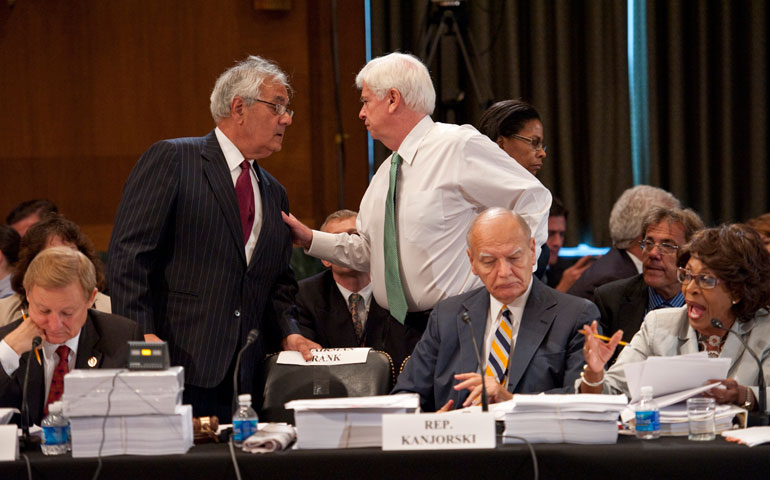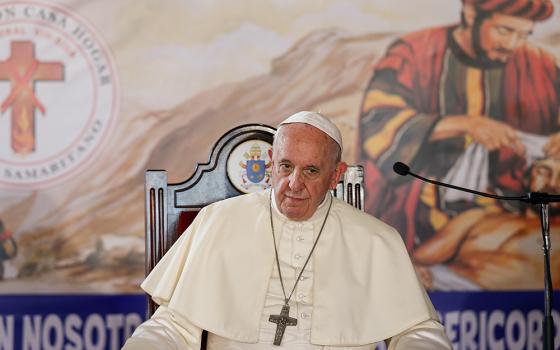
Rep. Barney Frank, standing at left, consults with Sen. Christopher Dodd during the House-Senate conference on a comprehensive financial regulatory overhaul bill on June 23, 2010. (Newscom/Congressional Quarterly/Scott J. Ferrell)
 ACT OF CONGRESS: HOW AMERICA’S ESSENTIAL INSTITUTION WORKS, AND HOW IT DOESN’T
ACT OF CONGRESS: HOW AMERICA’S ESSENTIAL INSTITUTION WORKS, AND HOW IT DOESN’T
By Robert G. Kaiser
Published by Alfred A. Knopf, $27.95
Congress is a mess. The politicians are at each other’s throats. The parties can’t, won’t work together. Act of Congress is about a major effort to get them to do just that. It didn’t work. But we did get landmark legislation that should prevent Wall Street and the banks from again putting the country at risk. As a former congressional correspondent, I can remember a time when there was plenty of rhetoric, but bipartisan schmoozing could also kick in to break deadlocks, instead of the political crockery we see today.
In this case, it took a political high-wire act and some noisome sausage-making in 2009-2010 to produce the Dodd-Frank Wall Street Reform and Consumer Protection Act. The act reasserted the kind of control over the financial world that had rescued us from the 1930s Great Depression and helped sustain what really made America great -- not free enterprise and freebooting, but a willingness to talk across political and economic lines to ensure that as many Americans as possible could prosper. Dodd-Frank set new rules for American capitalism and new protections for investors and consumers, as retired Massachusetts Democrat Barney Frank, then the House Financial Services Committee chairman, put it.
With the country still reeling from the economic crash of 2007-2008, the Obama administration in 2009 drafted a plan to resurrect government’s role as the public’s watchdog, a role that had been squashed by the Republicans’ drive for deregulation. In a stroke of luck, the White House got the perfect managers for this complex legislation: shrewd, convivial Senate Banking Committee Chairman Chris Dodd, a Connecticut Democrat, and the feisty, wisecracking Frank, a wonk among wonks on finance.
Both understood the “feel moments” in Congress, as Dodd called them -- knowing when to stroke egos or knock heads, when to hold and when to fold in negotiations to keep legislation alive. But there also was a lot of finger-crossing and fudging over the 18 months of hearings, jockeying in committee and haggling over amendments to the bill. And it had to survive a threatened Republican Senate filibuster and not-so-friendly fire from Democrats seeking tougher curbs on banks’ investments.
Kaiser, a longtime Washington Post reporter and editor, provides an instructive, colorful guide to the maneuverings as Dodd and Frank played their two aces in the hole: a public that wanted to crack down on the “malefactors of great wealth” and their hirelings, as Teddy Roosevelt had called them; and Democratic majorities in both houses. And for both of them it was a last hurrah -- a chance to put their names on historic legislation on the eve of retiring from the Hill.
Dodd-Frank actually was a complex package of bills that stiffened oversight of Wall Street risk-taking and restricted the financial giants who had gambled with the economy. It required banks to report more fully on their operations and curb risky investment. And it created the Consumer Financial Protection Bureau to shield Americans from predatory mortgage, investment and credit card practices. Other provisions included greater scrutiny of hedge funds and of the agencies that rated securities.
The two managers labored to win bipartisan support, but in the end only three out of 41 Republican senators voted for the legislation and only three GOP House members joined the 237-192 majority. Minority leader Mitch McConnell of Kentucky kept his Senate Republicans chained to a foot-dragging party line on the bill, especially targeting the proposed consumer agency, which the Republicans, as Kaiser writes, saw as “a menace to American business.” Alabama Sen. Richard Shelby, minority leader of the Banking Committee, kept promising Dodd bipartisan support and then reversing himself, almost certainly, Kaiser says, because of fear of McConnell’s evil eye.
The heroes were the bright, inventive Dodd and Frank aides without whom the bill would have failed. They spent thousands of hours working out the substance of the legislation. There were compromises, but they never sacrificed its core strengths. Some even chummed with Republican staffers -- the kind of Washington socializing that once greased the skids for bipartisanship but has virtually disappeared. And they took on financial executives whose salaries and bonuses dwarfed their own pay.
Act of Congress is not exactly a made-for-television thriller. But Kaiser’s profiles of the players and his insights into the mores of Capitol Hill make it a classic study of how Congress works. And you don’t have to be a wonk to want to read on.
Not that it will make you feel a lot better about government. But the author does dispel some of the political mystery. Act of Congress can help some of us feel less powerless to change things. Kaiser cuts through the cant of supposed leaders, especially Republicans, who should be guiding us through the real world but substitute half-truths, concocted “facts” and ideological incantations for serious policymaking.
But Congress wound up saying far too little about the battering the country had taken because of the financial world’s recklessness and greed. The Republicans were certain that a limping economy would mean that President Barack Obama would not be re-elected. It precipitated the Republican crash, and since the election they have been groping for quick fixes.
My own reading is that unless the Democrats take a header, the Republicans can rise again only by nurturing a new generation of candidates who will listen to people who are hurting and learn how to talk to the new American majority.
But the GOP Energizer Bunny keeps trying to shrink government and weaken the watchdog that now must get tougher about regulating exploitation of the environment and preserving the quality and safety of food, prescription drugs, automobiles, cell phones, toys and a whole lot of other things.
Have we seen the last of the Chris Dodds and Barney Franks? Will we, as the author says, suffer from the ultimate “triumph of politics over policy,” with Congress doomed to be under the yoke of new Mitch McConnells and tea party cranks? Maybe. But political change is America’s middle name, and it is not a pipe dream to imagine a new generation of thoughtful, public-service-oriented leaders emerging from the current gloom to remake the political landscape. They clearly will be needed as Americans confront truly awesome challenges in dealing with a whole new world in the making.
[Lewis Wolfson is professor (emeritus) of communication at American University and a longtime Washington analyst.]



